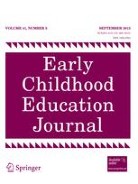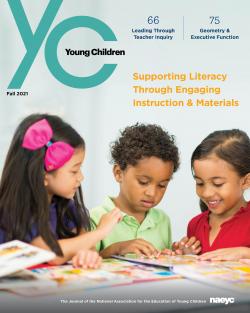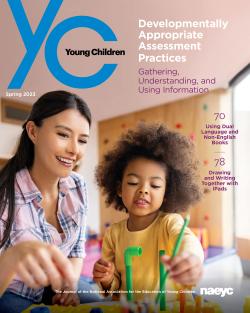
Examples of journals in this discipline include:
 Early Childhood Education Journal
Early Childhood Education Journal
 Young Children
Young Children
 Head Start Teacher Perceptions on Organizational Support of Adult–Child Interactions
by
Rodriguez, Sardis Susana, McKee, Aja
Head Start (HS) teachers are central to providing constructive adult–child interactions that prepare preschool-age students for school and future successes. This qualitative study included interviews with teachers and explored teachers' perceptions of organization and teacher well-being related to improving student outcomes. Understanding the HS teacher setting will help educators and administrators transform early childhood educational experiences for the better. Findings demonstrate barriers to delivering high-quality, adult–child interactions on a consistent basis in the classroom. These barriers include having two rather than three teachers in the classroom and facing three annual Desired Results Developmental Profile child assessments rather than the state-required two. Lack of access to high-quality and effective professional development was also not conducive to continuous learning. Organizations must give teachers opportunities to attend effective training on an ongoing basis to increase the sustainability of HS and to improve teachers' experiences. Finally, teachers in organizations that promoted teacher involvement in leadership teams had a more positive perspective on their value in decision making and within the organization. Teachers who advocate for themselves in leadership settings develop buy-in when it comes to decision making and ensuring program curricula, strategies, and policies are implemented consistently. [ABSTRACT FROM AUTHOR]
Head Start Teacher Perceptions on Organizational Support of Adult–Child Interactions
by
Rodriguez, Sardis Susana, McKee, Aja
Head Start (HS) teachers are central to providing constructive adult–child interactions that prepare preschool-age students for school and future successes. This qualitative study included interviews with teachers and explored teachers' perceptions of organization and teacher well-being related to improving student outcomes. Understanding the HS teacher setting will help educators and administrators transform early childhood educational experiences for the better. Findings demonstrate barriers to delivering high-quality, adult–child interactions on a consistent basis in the classroom. These barriers include having two rather than three teachers in the classroom and facing three annual Desired Results Developmental Profile child assessments rather than the state-required two. Lack of access to high-quality and effective professional development was also not conducive to continuous learning. Organizations must give teachers opportunities to attend effective training on an ongoing basis to increase the sustainability of HS and to improve teachers' experiences. Finally, teachers in organizations that promoted teacher involvement in leadership teams had a more positive perspective on their value in decision making and within the organization. Teachers who advocate for themselves in leadership settings develop buy-in when it comes to decision making and ensuring program curricula, strategies, and policies are implemented consistently. [ABSTRACT FROM AUTHOR]
 Functional Assessment and Positive Behavior Support: The Role of Early Learning Program Leaders and Teachers
by
Kaiser, Barbara and Rasminsky, Judy Sklar
The article offers information on the use of Positive Behavior Support (PBS) and Functional Assessment (FA) as strategies to create a positive school climate and address challenging behavior in young children. FA is a tiered strategy that allows educators to observe a child closely and collect data to determine the function or purpose of the challenging behavior. The purpose of these strategies is to create an individual behavior support plan that will empower the child to develop.
Functional Assessment and Positive Behavior Support: The Role of Early Learning Program Leaders and Teachers
by
Kaiser, Barbara and Rasminsky, Judy Sklar
The article offers information on the use of Positive Behavior Support (PBS) and Functional Assessment (FA) as strategies to create a positive school climate and address challenging behavior in young children. FA is a tiered strategy that allows educators to observe a child closely and collect data to determine the function or purpose of the challenging behavior. The purpose of these strategies is to create an individual behavior support plan that will empower the child to develop.